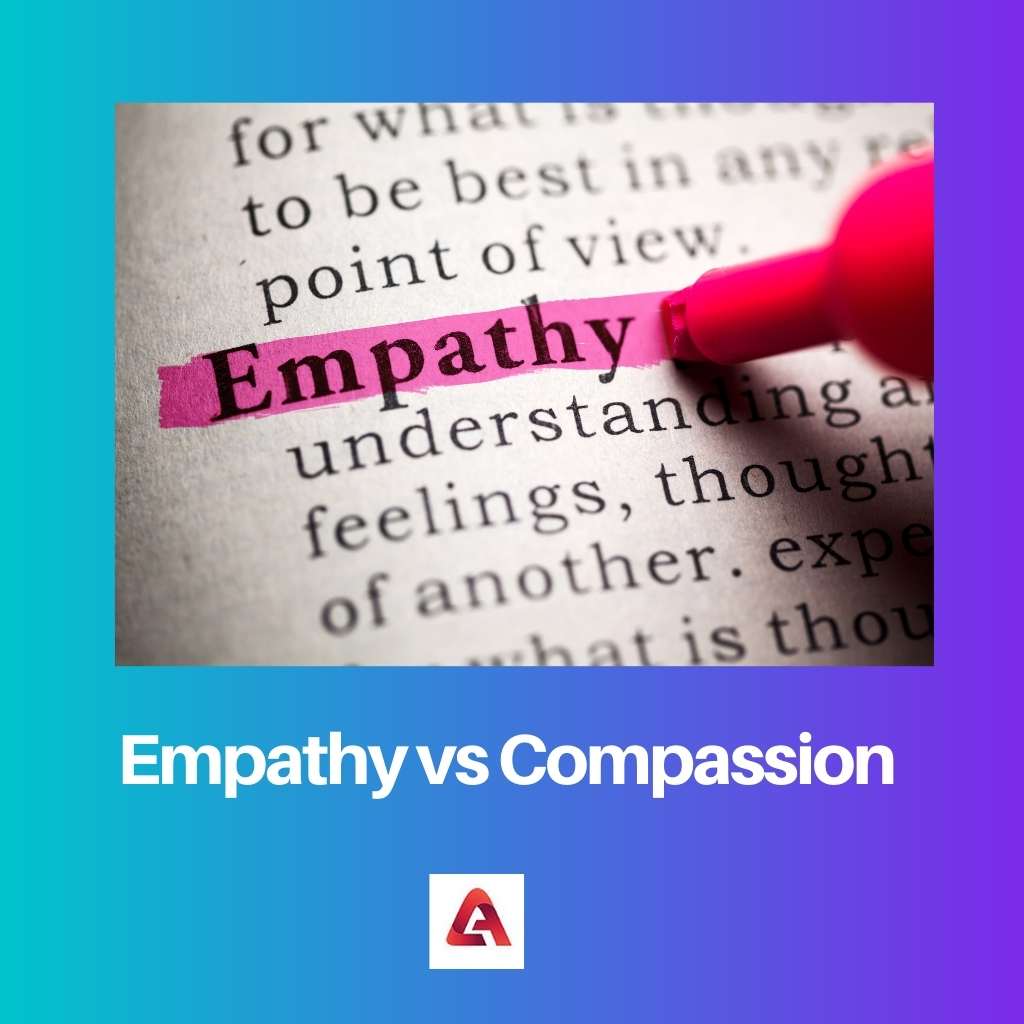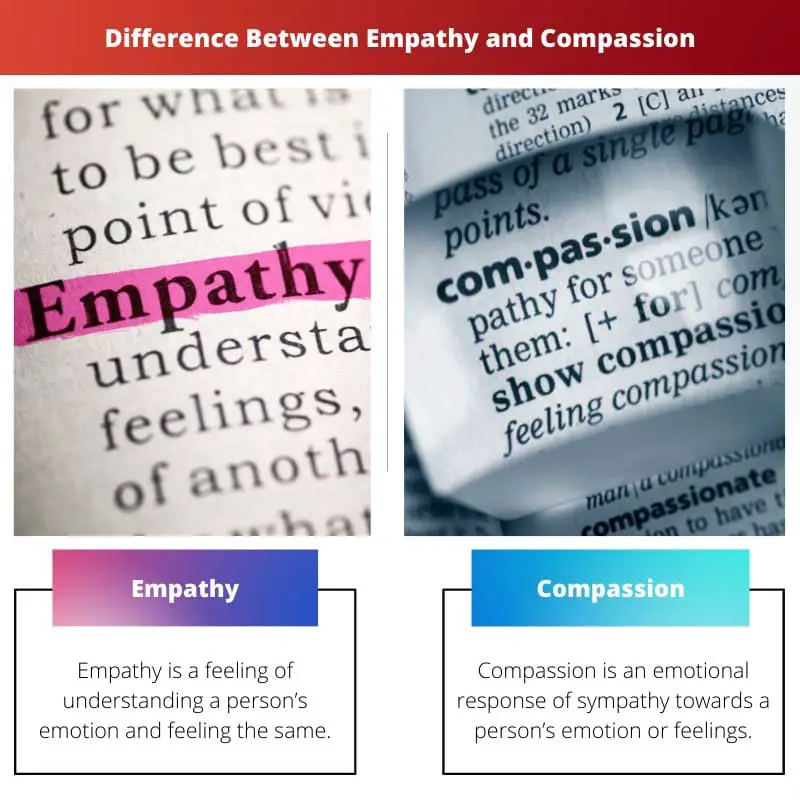Empathy and compassion are being used interchangeably, yet they are not synonymous. But, people tend to misunderstand them as the same words, although they are kinda similar to each other.
These words have a very deep concept applicable to every part of life. And they are the center of ethics in every part.
Key Takeaways
- Empathy involves understanding and sharing another’s feelings, while compassion focuses on the desire to alleviate suffering.
- Empathy can lead to emotional distress, whereas compassion inspires constructive action.
- Compassion is a broader concept than empathy, as it includes understanding emotions and taking action to help.
Empathy vs Compassion
Empathy is the ability to understand and care for others, such as when they are going through a difficult time. Compassion is a desire to alleviate the suffering of others and take action to help them, such as volunteering at a homeless shelter, donating to charity, or offering support.

Empathy is an emotion that enables one to understand another person’s emotions and feeling at the same time. In other words, putting themselves in others’ shoes.
Empathy happens immediately, therefore it is impulsive and can isolate two humans. Additionally, it is static and it can consume and drain the energy of the empathizer.
Compassion is also an emotion but it is an emotional response to sympathy towards a person’s feeling or emotion. It doesn’t happen immediately, yet it is more intentional or conscious.
So, it is more cognitive in nature. Moreover, it unifies humans and is vital. Additionally, it renews and revives the energy.
Comparison Table
| Parameters of comparison | Empathy | Compassion |
|---|---|---|
| Definition | Empathy is a feeling of understanding a person’s emotion and feeling the same. | Compassion is an emotional response of sympathy towards a person’s emotion or feelings. |
| Period | Empathy happens immediately. | Compassion is cognitive in nature. |
| Impact on human relations | Empathy can be isolating two people. | Compassion lets us unify human relations. |
| Energy | Empathy is static. | Compassion is vital. |
| Effect on energy | Empathy is consuming and can drain energy. | Compassion renews and revives energy. |
What is Empathy?
Empathy and compassion are kinda similar, though they are very different from each other. Empathy is an emotion that enables one to understand another person’s emotions and feeling at the same time. In other words, putting themselves in others’ shoes.
Empathy lets empathizer to how the other person feels. It is ingrained in our bodies and mind. That’s why we don’t even realize that instinctively we try to understand others’ feelings. ANd this type of empathy is known as cognitive empathy.
It is good for our personal and work relationships as it lets empathizers see broadly and feel others’ emotions.
But, there are cons of empathy as well. As empathy may result in bias, empathizers will connect to people whose experiences are more relatable.
And the reason for that is empathy comes from similarity. Empathy, in general, would be good, but when the bias factor comes into play. It would affect many possible relations.
Empathy happens immediately, therefore it is impulsive and can isolate two humans. Relatability plays a part in this which results in immediate bias for that specific person, while it may hurt other people’s feelings.
Moreover, empathy is very consuming. An empathizer will empathize with other people’s feelings to the point where they burn out themselves. Therefore, it is said empathy drains energy a lot.

What is Compassion?
Compassion is also an emotion but if it is defined exactly, then it is an emotional response to sympathy towards a person’s feeling or emotion.
Compassion creates an emotional distance from the individual and situation. An emotional distance is required for keeping themselves energetic and understanding them as well.
Simply, if a person disagrees with a statement, then an angry and defensive response comes. But, here, how can compassion play a role?
Compassion lets the person think rationally and go beyond emotion and give a response with kindness regardless of whatever happens.
Moreover, it lets one understand the person and be sympathetic to them. And being there to help them or standing for them. It is very different from empathy or sympathy.
As empathy lets one understand another person’s feelings, but compassion lets one understand another person’s feelings as well as helping to overcome them.
Unlike empathy, compassion doesn’t come with biases, therefore, it is much rational and fair. Compassion does work immediately, but it works more consciously than instinctively. Indeed, it is cognitive.
Moreover, it easily let’s connect and is a vital part. Additionally, it doesn’t consume or drain the energy of the one, yet it reviews and renews.

Main Differences Between Empathy and Compassion
Many emotions are felt by humans from compassion to sadness. Different emotions are evoked due to different situations and encounters.
So, it all depends on the situations, encounters, and surroundings as well as a person’s nature. One of them is empathy and compassion, both are very different from each other.
Yet, they are being used interchangeably. Although, they work best together. But, they are naturally inherited. Moreover, they are considered to be deep concepts, but it applies to every part of life.
- Empathy is a feeling of understanding a person’s emotion and feeling the same. While compassion is an emotional response of sympathy towards a person’s emotion or feelings.
- Empathy happens immediately, while compassion is cognitive.
- Empathy can be isolating two people, while compassion lets unify human relations.
- Empathy is static, while compassion is vital.
- Empathy is consuming and can drain energy. Meanwhile, compassion renews and revives energy.






